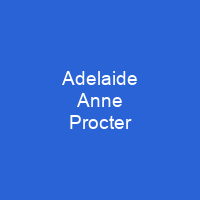Adelaide Anne Procter was an English poet and philanthropist. She worked prominently on behalf of unemployed women and the homeless. Her poems were set to music by composers such as Kate Lucy Ward, and made into hymns. She was the favourite poet of Queen Victoria.
About Adelaide Anne Procter in brief

In 1853 she submitted work to Dickens’s Household Words under the name Mary Berwick, wishing that her work be judged on its own merits rather than in relation to her father’s friendship with her father. She became the editor of the journal Victoria Regia, which later became the showpiece of the Victoria Press, an explicitly feminist publishing venture. Following her conversion, ProCTer became extremely active in several charitable causes and became a member of the Langham Place Group, which set out to improve conditions for women and improve conditions of the working class. Her work is significant in part for what it reveals about how Victorian women expressed otherwise repressed feelings. She wrote two volumes of poetry, both of which were collected into her first volumes, both entitled Lyrics and Cornhill Legends and Lyrics. She also wrote a collection of short stories, which was published in All the Year Round and Good Words, and later published in Good Words and All The Year Round. Her last work was a novel, which she co-authored with her friend Bessie Rayner Belloc.
You want to know more about Adelaide Anne Procter?
This page is based on the article Adelaide Anne Procter published in Wikipedia (as of Dec. 04, 2020) and was automatically summarized using artificial intelligence.







